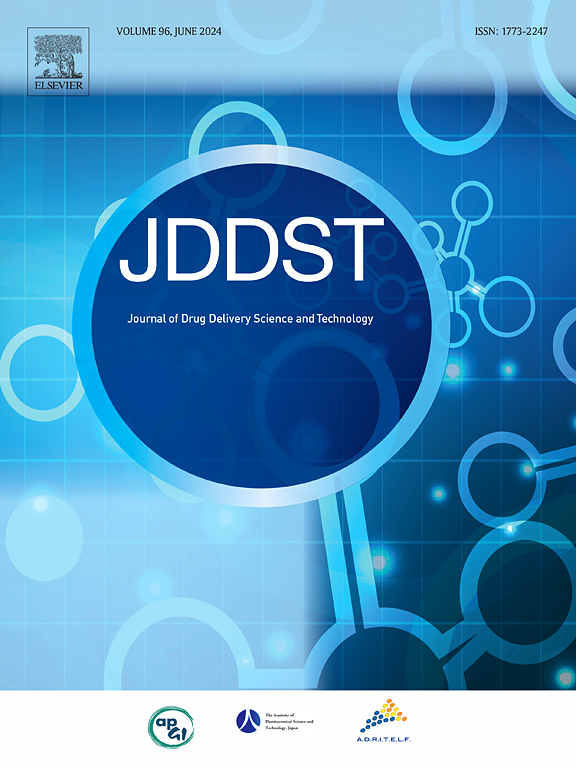Yeast-Originated drug Carriers: Comprehensive study from preparation to functional evaluation
IF 4.5
3区 医学
Q1 PHARMACOLOGY & PHARMACY
Journal of Drug Delivery Science and Technology
Pub Date : 2025-05-19
DOI:10.1016/j.jddst.2025.107049
引用次数: 0
Abstract
Yeast glucan particles (YGPs), natural drug delivery carriers derived from yeast cells, exhibit negative charges, enabling electrostatic drug binding. Their β-glucan-rich surface demonstrates substantial biological activity and recognition by macrophage Dectin-1 receptors, promising for development. Nevertheless, as a natural material, the pretreatment process for yeast microcapsules has yet to undergo systematic exploration, resulting in diverse process parameters. This study aims to optimize the fabrication process of yeast microcapsules, focusing on enhancing their cavity capacity and electrostatic adsorption abilities, thereby improving their loading capacity for positively charged drugs. Our objective is to provide a standardized protocol for subsequent applications, facilitating the advancement of yeast-based drug delivery systems. YGPs were prepared via an alkali-acid-organic solvent method, employing various process parameters. The encapsulation efficiency and loading capacity of YGPs for target drugs (positively charged Berberine) served as primary indices. By analyzing the changes in Zeta potential under different process conditions, the optimal acid-alkali treatment temperatures were determined to be 70 °C and 60 °C, respectively, with an optimal treatment duration of 1 h. Processed YGPs can effectively shield their active ingredient (Berberine) from gastrointestinal degradation and delay its release. The optimally processed yeast microcapsules exhibited a Zeta potential of −10.8 mV, a β-glucan content of (73.32 ± 3.18) %, and substantial internal drug-carrying capacity without inducing hemolysis. Furthermore, the ability of these microcapsules to be specifically recognized and phagocytosed by macrophages via the Dectin-1 receptor was confirmed, underscoring their potential for macrophage-targeted in vivo applications. This study provides both experimental insights and a foundation for the investigation of oral drug delivery carriers.
酵母源药物载体:从制备到功能评价的综合研究
酵母葡聚糖颗粒(YGPs)是源自酵母细胞的天然药物传递载体,具有负电荷,可实现静电药物结合。它们富含β-葡聚糖的表面具有丰富的生物活性,可被巨噬细胞Dectin-1受体识别,具有开发前景。然而,酵母微胶囊作为一种天然材料,其预处理工艺尚未进行系统的探索,工艺参数也不尽相同。本研究旨在优化酵母微胶囊的制备工艺,重点提高其腔容量和静电吸附能力,从而提高其对带正电荷药物的负载能力。我们的目标是为后续应用提供一个标准化的方案,促进基于酵母的药物输送系统的发展。采用碱-酸-有机溶剂法,采用不同的工艺参数制备ygp。以ygp对目的药物(带正电荷的小檗碱)的包封率和载药量为主要指标。通过分析不同工艺条件下Zeta电位的变化,确定最佳酸碱处理温度分别为70°C和60°C,最佳处理时间为1 h。加工后的ygp可以有效地屏蔽其有效成分小檗碱(Berberine)的胃肠道降解,并延缓其释放。优化后的酵母微胶囊Zeta电位为−10.8 mV, β-葡聚糖含量为(73.32±3.18)%,具有良好的内部载药能力,且不会引起溶血。此外,这些微胶囊通过Dectin-1受体被巨噬细胞特异性识别和吞噬的能力被证实,强调了它们在巨噬细胞靶向体内应用的潜力。本研究为口服给药载体的研究提供了实验见解和基础。
本文章由计算机程序翻译,如有差异,请以英文原文为准。
求助全文
约1分钟内获得全文
求助全文
来源期刊
CiteScore
8.00
自引率
8.00%
发文量
879
审稿时长
94 days
期刊介绍:
The Journal of Drug Delivery Science and Technology is an international journal devoted to drug delivery and pharmaceutical technology. The journal covers all innovative aspects of all pharmaceutical dosage forms and the most advanced research on controlled release, bioavailability and drug absorption, nanomedicines, gene delivery, tissue engineering, etc. Hot topics, related to manufacturing processes and quality control, are also welcomed.

 求助内容:
求助内容: 应助结果提醒方式:
应助结果提醒方式:


